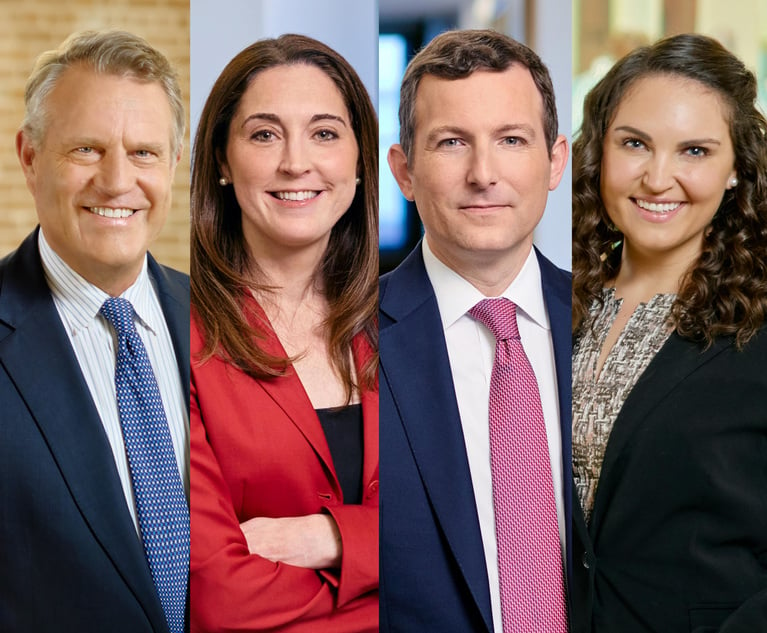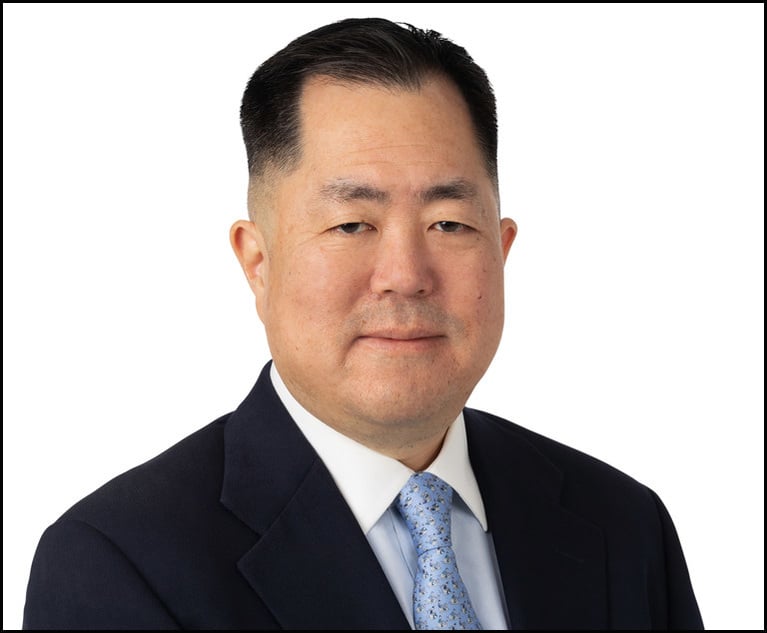 Lyft car (Photo: Jason Doiy/ALM)
Lyft car (Photo: Jason Doiy/ALM)SF City Attorney Opens New Front Against Gig Companies After Landmark Labor Ruling
“The argument that these companies have tried to use in the past—that they're just a technology platform—doesn't pass the smell test,” San Francisco City Attorney Dennis Herrera says. “People go to Microsoft or Salesforce for software. People go to Uber or Lyft for a ride.”
May 29, 2018 at 06:13 PM
4 minute read
Seizing on a recent ruling by the California Supreme Court, San Francisco City Attorney Dennis Herrera on Tuesday issued subpoenas to Uber and Lyft for records related to whether their drivers should be classified as employees or independent contractors.
California's high court late last month opened a new front in worker classification litigation when it set stricter standards for companies that label workers as contractors and not employees. Herrera said in a statement that the ruling “directly affects” San Francisco's employment laws, including its minimum wage ordinance and health care requirements.
“We don't know whether these ride-hailing companies are breaking the law until they provide the information we seek in these subpoenas,” Herrera said. “We are going to ensure that these companies comply with the Supreme Court's ruling and with San Francisco's laws.”
Lyft spokesman Adrian Durbin said leaders of the ride-hailing app “look forward to helping the city attorney's office fully understand Lyft's business model, including our relationship with drivers.” Durbin said the median earnings for Lyft drivers in the San Francisco region are $25 per hour before expenses.
An Uber representative was not immediately reached Thursday for comment.
The administrative subpoenas were issued to Lyft Inc, Uber Technologies Inc. and Uber's California subsidiary, Rasier LLC. Herrera's demand seeks lists of drivers who provided at least one ride in San Francisco since 2015; documents showing whether those drivers are labeled as employees or independent contractors “for purposes of San Francisco and/or California law;” records indicating how drivers are paid, how many hours they work and whether they receive any benefits; and proof that drivers labeled independent contractors meet the criteria set out by the Supreme Court.
“The argument that these companies have tried to use in the past—that they're just a technology platform—doesn't pass the smell test,” Herrera said. “People go to Microsoft or Salesforce for software. People go to Uber or Lyft for a ride.”
Herrera's subpoenas could provide one of the first regulatory opportunities to test the rules laid out by the justices in Dynamex Operations West Inc. v. Superior Court. Management-side attorneys have predicted a flood of litigation in wake of the ruling as California's many on-demand companies seek to protect business models that rely on designated independent contractors. Dynamex and two employer trade groups have urged the court to not apply its ruling retroactively.
The subpoenas are just the latest challenge by San Francisco to the hometown operations of Lyft and Uber. Last June, Herrera sought four years of data from the two companies about how their many drivers affect city traffic, pedestrian safety and parking. Lyft reached a settlement with the city attorney's office. Uber is appealing a San Francisco Superior Court ruling in the city's favor.
In 2016, Uber agreed to pay up to $25 million to settle litigation brought by San Francisco and Los Angeles for making misleading claims about its driver background checks. Lyft settled similar claims in 2014 for $500,000.
Read more:
This content has been archived. It is available through our partners, LexisNexis® and Bloomberg Law.
To view this content, please continue to their sites.
Not a Lexis Subscriber?
Subscribe Now
Not a Bloomberg Law Subscriber?
Subscribe Now
NOT FOR REPRINT
© 2025 ALM Global, LLC, All Rights Reserved. Request academic re-use from www.copyright.com. All other uses, submit a request to [email protected]. For more information visit Asset & Logo Licensing.
You Might Like
View All
Apple Disputes 'Efforts to Manufacture' Imaging Sensor Claims Against iPhone 15 Technology

'Another Broken Promise': California Tribes Sue Casinos for Allegedly Illegal Profit From Card Games

After Solving Problems for Presidents, Ron Klain Now Applying Legal Prowess to Helping Airbnb Overturn NYC Ban
7 minute read
Husch Blackwell Hires Former Adobe Counsel to Oversee AI Advisory Offering
3 minute readTrending Stories
Who Got The Work
Michael G. Bongiorno, Andrew Scott Dulberg and Elizabeth E. Driscoll from Wilmer Cutler Pickering Hale and Dorr have stepped in to represent Symbotic Inc., an A.I.-enabled technology platform that focuses on increasing supply chain efficiency, and other defendants in a pending shareholder derivative lawsuit. The case, filed Oct. 2 in Massachusetts District Court by the Brown Law Firm on behalf of Stephen Austen, accuses certain officers and directors of misleading investors in regard to Symbotic's potential for margin growth by failing to disclose that the company was not equipped to timely deploy its systems or manage expenses through project delays. The case, assigned to U.S. District Judge Nathaniel M. Gorton, is 1:24-cv-12522, Austen v. Cohen et al.
Who Got The Work
Edmund Polubinski and Marie Killmond of Davis Polk & Wardwell have entered appearances for data platform software development company MongoDB and other defendants in a pending shareholder derivative lawsuit. The action, filed Oct. 7 in New York Southern District Court by the Brown Law Firm, accuses the company's directors and/or officers of falsely expressing confidence in the company’s restructuring of its sales incentive plan and downplaying the severity of decreases in its upfront commitments. The case is 1:24-cv-07594, Roy v. Ittycheria et al.
Who Got The Work
Amy O. Bruchs and Kurt F. Ellison of Michael Best & Friedrich have entered appearances for Epic Systems Corp. in a pending employment discrimination lawsuit. The suit was filed Sept. 7 in Wisconsin Western District Court by Levine Eisberner LLC and Siri & Glimstad on behalf of a project manager who claims that he was wrongfully terminated after applying for a religious exemption to the defendant's COVID-19 vaccine mandate. The case, assigned to U.S. Magistrate Judge Anita Marie Boor, is 3:24-cv-00630, Secker, Nathan v. Epic Systems Corporation.
Who Got The Work
David X. Sullivan, Thomas J. Finn and Gregory A. Hall from McCarter & English have entered appearances for Sunrun Installation Services in a pending civil rights lawsuit. The complaint was filed Sept. 4 in Connecticut District Court by attorney Robert M. Berke on behalf of former employee George Edward Steins, who was arrested and charged with employing an unregistered home improvement salesperson. The complaint alleges that had Sunrun informed the Connecticut Department of Consumer Protection that the plaintiff's employment had ended in 2017 and that he no longer held Sunrun's home improvement contractor license, he would not have been hit with charges, which were dismissed in May 2024. The case, assigned to U.S. District Judge Jeffrey A. Meyer, is 3:24-cv-01423, Steins v. Sunrun, Inc. et al.
Who Got The Work
Greenberg Traurig shareholder Joshua L. Raskin has entered an appearance for boohoo.com UK Ltd. in a pending patent infringement lawsuit. The suit, filed Sept. 3 in Texas Eastern District Court by Rozier Hardt McDonough on behalf of Alto Dynamics, asserts five patents related to an online shopping platform. The case, assigned to U.S. District Judge Rodney Gilstrap, is 2:24-cv-00719, Alto Dynamics, LLC v. boohoo.com UK Limited.
Featured Firms
Law Offices of Gary Martin Hays & Associates, P.C.
(470) 294-1674
Law Offices of Mark E. Salomone
(857) 444-6468
Smith & Hassler
(713) 739-1250






